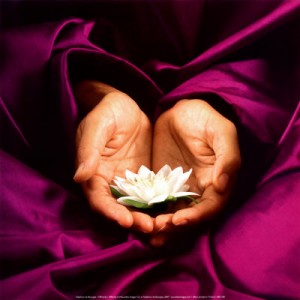![baby-robin-061209-lg[1]](https://www.tibetanbuddhistaltar.org/wp-content/uploads/2010/08/baby-robin-061209-lg1-300x234.jpg)
An excerpt from a teaching called Viewing the Guru: The Seven Limb Puja by Jetsunma Ahkon Norbu Lhamo on October 18, 1995
Since we are in the face of the Guru constantly the next posture we should keep ourselves in is beseeching the Buddhas and Bodhisattvas and the Lamas to remain. Where would you be now if suddenly your root Guru disappeared? You should ask that question of someone who has experienced the horrible, horrible occurrence of knowing the death of their Guru. There are many students who have actually experienced the death of the Guru. If you think practice is hard now, you should think what it must be like to go through the pain of knowing that your Guru is no longer in the world. Then one has to reach even more deeply, and if you think that we are weak now, try to imagine how it would be if we have to reach even more deeply, in a more profound way, into our practice: knowing that the Guru is no longer in the world, knowing that there will not be physical teachings forthcoming. How can we find the Guru? It’s very frightening; it’s very scary, to think that there might be a time like that.
On one level we think how awful it would be not to be in the physical presence, the here and now presence, with constant teachings occurring from the Guru in a physical way. But now we should think in a broader sense. What would it be like if our Gurus had simply attained realization, and then gone on and remained in nirvana? What if they had attained realization and then never appeared in samsara again? What would that be like? Well, that would mean that in samsara there would be no teaching. There would be no method. There would be no means by which to accomplish Dharma. There would only be the means to accomplish non-virtue. There would be endless suffering that would be constantly compounded every single moment as though it were like a geometric progression — constantly increasing, with no leveling off, with no cessation, with no chance, no opportunity, no change. Life would be constantly miserable. All of the poisons: hatred, greed, ignorance, jealousy, pride, war, suffering, all of the results of those would only be ripened. And there would be no relief, no method by which to accomplish relief. We can’t even imagine that: no means by which to accomplish virtue. We can’t even imagine that. It is so unthinkable that we can’t even imagine that.
And yet, we can’t even give a moment to think how miraculous it is that our Guru has returned to face us in the world in our confusion. Because we can’t see the Guru in our mind, because we can’t see the Guru in our inner channels, winds and fluids, because we can’t see the Guru in our nature, the Guru then appears to us through the shit and thickness of our stinking delusions and in this face, with this skin, this flesh, appears as the miraculous. And we don’t even have a minute to request that this never be any different; that it is always the case that the Gurus, the Buddhas, the Bodhisattvas will return for the sake of sentient beings. We never think how miraculous it is, how marvelous it is, how unequalled by any other gift or any other miracle. So concerned with our own superficial lives we have not even a moment to spare to thank the teacher for returning to us. To thank them. Think what they did! They did not pass into nirvana. But it doesn’t mean that they haven’t accomplished their practice. It doesn’t mean that, in truth, they do not actually spontaneously abide in nirvana now. But it also means that they appear in the world, under samsaric conditions, for our sake. And we don’t even have a minute a day to rejoice in that, and request them to remain. We should contemplate on what it would be like to remain in the world without any source of liberation. We should constantly be thinking what it would be like if the Buddhas and Bodhisattvas did not enter into samsara for us, did not enter into the world for our sake, did not appear among us, as us, in a form that we could understand, and digest, and empathize with.
We should think what that would be like, and having contemplated on that, realize it would be unthinkably, horribly, worse than any suffering we have ever experienced or could ever imagine experiencing. Try to imagine what it would be like with no help. Having thought about that, with that kind of energy, the energy that comes from that, every time we see our teacher, we should think in our mind, “Please remain in the world. Oh, please, remain in the world. Oh, please remain in the world.” We should be thinking like that when we say our teachers long life prayers. We should think like that constantly, be in the posture of constantly requesting the Buddhas and Bodhisattvas, those who have attained realization, to remain within the world; constantly requesting that.
Now, how would you be constantly requesting that? By expressing, knowing and facing with purity and honesty your dependence upon the Guru for liberation. A little child lets its need of the mother be known. A little child has a booboo and brings it to the mother to be kissed, and the mother knows– the mother knows even if the child doesn’t say, “I love you” how much the child needs the mother. The mother knows; it’s a natural communication that they have. And when the child says to the mother with total confidence, “I am hungry,” the mother knows. There are no spoken words of love there, there’s no effusiveness, but the mother knows that the child is utterly and completely dependent. The mother knows that the child is confident, that the child sees the mother as a fountain of blessing. The mother knows that the child’s life would be lost without the support of the mother. And so the mother knows that love. And when the child is cold, the child goes to the mother and asks to be held, warmed up. When the child is lonely and afraid, the child goes to the mother and asks to be rocked and loved and sung to. And even though the child may not say, “I love you, Mother,” still, the mother sees the child’s need and understands the relationship.
If that is so with ordinary mothers and ordinary children, then if we express our need for the Guru, without shame, without pride, without fear of being humble, if we constantly express our need and our appreciation and our confidence in the Guru, then in that way we are also expressing that we wish the Guru to remain. But if our hearts are hard and we say, “Oh, nice teaching. Now I’ll go and do what I need to do,” and there is no relationship of that intimate nature, like a mother and a child, then there is no practice. And there’s the question: is the love so strong in your heart, is the understanding so profound and so wise, that, in fact, you really do wish the Buddhas to remain in the world? We don’t know. There is the question. And the practice I’ve just given you, the way I’ve just given you to hold your mind and hold yourself, this would be the answer to that. Think of yourself like a child and the Guru is like your dear, dear mother who gives you everything. We bring all our booboos, our coldness, our loneliness, our fear, our hunger, our hurt, everything. These things we bring, because in the face of the primordial empty nature, in the face of luminosity, in the face of the great miraculous Bodhicitta, these things disappear, and all our booboos are kissed.
© Jetsunma Ahkön Lhamo

![bodhisattvas[1]](https://www.tibetanbuddhistaltar.org/wp-content/uploads/2010/08/bodhisattvas1.jpg)

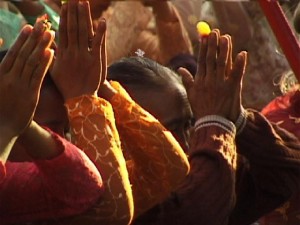
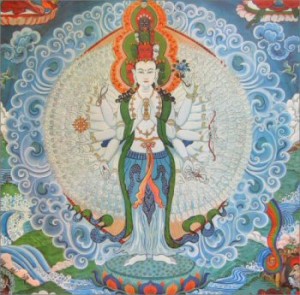
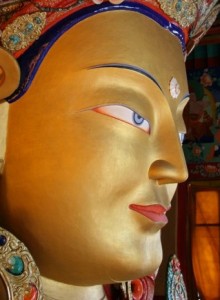
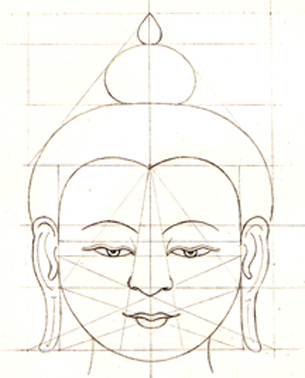
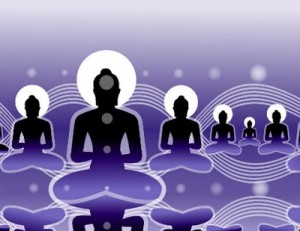
![baby-robin-061209-lg[1]](https://www.tibetanbuddhistaltar.org/wp-content/uploads/2010/08/baby-robin-061209-lg1-300x234.jpg)
